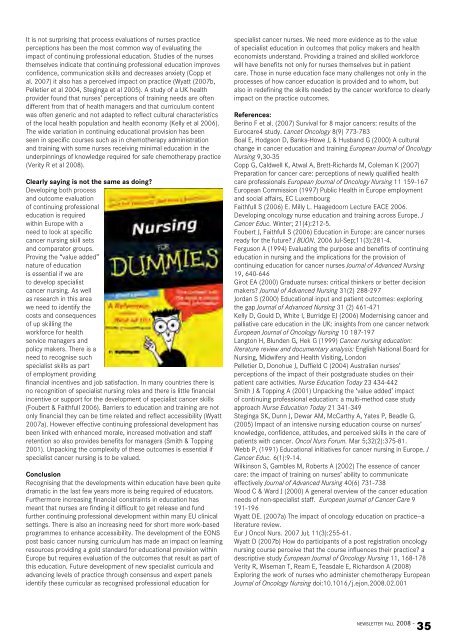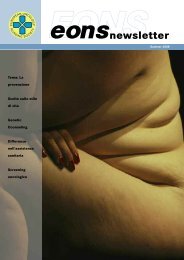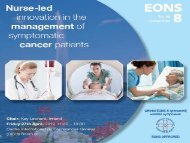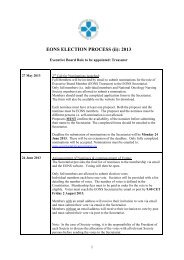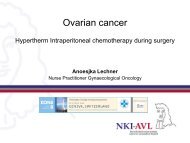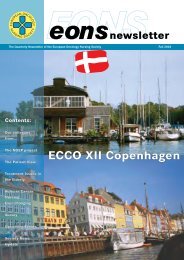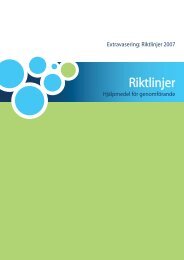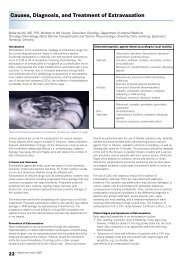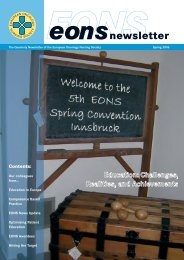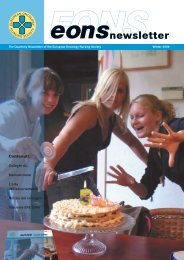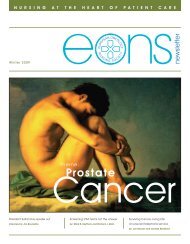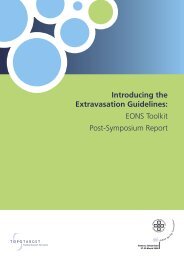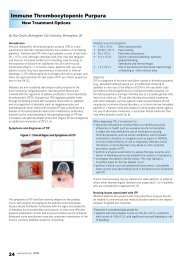English - the European Oncology Nursing Society
English - the European Oncology Nursing Society
English - the European Oncology Nursing Society
- No tags were found...
You also want an ePaper? Increase the reach of your titles
YUMPU automatically turns print PDFs into web optimized ePapers that Google loves.
It is not surprising that process evaluations of nurses practiceperceptions has been <strong>the</strong> most common way of evaluating <strong>the</strong>impact of continuing professional education. Studies of <strong>the</strong> nurses<strong>the</strong>mselves indicate that continuing professional education improvesconfidence, communication skills and decreases anxiety (Copp etal. 2007) it also has a perceived impact on practice (Wyatt (2007b,Pelletier et al 2004, Steginga et al 2005). A study of a UK healthprovider found that nurses’ perceptions of training needs are oftendifferent from that of health managers and that curriculum contentwas often generic and not adapted to reflect cultural characteristicsof <strong>the</strong> local health population and health economy (Kelly et al 2006).The wide variation in continuing educational provision has beenseen in specific courses such as in chemo<strong>the</strong>rapy administrationand training with some nurses receiving minimal education in <strong>the</strong>underpinnings of knowledge required for safe chemo<strong>the</strong>rapy practice(Verity R et al 2008).Clearly saying is not <strong>the</strong> same as doing?Developing both processand outcome evaluationof continuing professionaleducation is requiredwithin Europe with aneed to look at specificcancer nursing skill setsand comparator groups.Proving <strong>the</strong> “value added”nature of educationis essential if we areto develop specialistcancer nursing. As wellas research in this areawe need to identify <strong>the</strong>costs and consequencesof up skilling <strong>the</strong>workforce for healthservice managers andpolicy makers. There is aneed to recognise suchspecialist skills as partof employment providingfinancial incentives and job satisfaction. In many countries <strong>the</strong>re isno recognition of specialist nursing roles and <strong>the</strong>re is little financialincentive or support for <strong>the</strong> development of specialist cancer skills(Foubert & Faithfull 2006). Barriers to education and training are notonly financial <strong>the</strong>y can be time related and reflect accessibility (Wyatt2007a). However effective continuing professional development hasbeen linked with enhanced morale, increased motivation and staffretention so also provides benefits for managers (Smith & Topping2001). Unpacking <strong>the</strong> complexity of <strong>the</strong>se outcomes is essential ifspecialist cancer nursing is to be valued.ConclusionRecognising that <strong>the</strong> developments within education have been quitedramatic in <strong>the</strong> last few years more is being required of educators.Fur<strong>the</strong>rmore increasing financial constraints in education hasmeant that nurses are finding it difficult to get release and fundfur<strong>the</strong>r continuing professional development within many EU clinicalsettings. There is also an increasing need for short more work-basedprogrammes to enhance accessibility. The development of <strong>the</strong> EONSpost basic cancer nursing curriculum has made an impact on learningresources providing a gold standard for educational provision withinEurope but requires evaluation of <strong>the</strong> outcomes that result as part ofthis education. Future development of new specialist curricula andadvancing levels of practice through consensus and expert panelsidentify <strong>the</strong>se curricular as recognised professional education forspecialist cancer nurses. We need more evidence as to <strong>the</strong> valueof specialist education in outcomes that policy makers and heal<strong>the</strong>conomists understand. Providing a trained and skilled workforcewill have benefits not only for nurses <strong>the</strong>mselves but in patientcare. Those in nurse education face many challenges not only in <strong>the</strong>processes of how cancer education is provided and to whom, butalso in redefining <strong>the</strong> skills needed by <strong>the</strong> cancer workforce to clearlyimpact on <strong>the</strong> practice outcomes.References:Berino F et al. (2007) Survival for 8 major cancers: results of <strong>the</strong>Eurocare4 study. Lancet <strong>Oncology</strong> 8(9) 773-783Boal E, Hodgson D, Banks-Howe J, & Husband G (2000) A culturalchange in cancer education and training <strong>European</strong> Journal of <strong>Oncology</strong><strong>Nursing</strong> 9,30-35Copp G, Caldwell K, Atwal A, Brett-Richards M, Coleman K (2007)Preparation for cancer care: perceptions of newly qualified healthcare professionals <strong>European</strong> Journal of <strong>Oncology</strong> <strong>Nursing</strong> 11 159-167<strong>European</strong> Commission (1997) Public Health in Europe employmentand social affairs, EC LuxembourgFaithfull S (2006) E. Milly L. Haagedoorn Lecture EACE 2006.Developing oncology nurse education and training across Europe. JCancer Educ. Winter; 21(4):212-5.Foubert J, Faithfull S (2006) Education in Europe: are cancer nursesready for <strong>the</strong> future? J BUON. 2006 Jul-Sep;11(3):281-4.Ferguson A (1994) Evaluating <strong>the</strong> purpose and benefits of continuingeducation in nursing and <strong>the</strong> implications for <strong>the</strong> provision ofcontinuing education for cancer nurses Journal of Advanced <strong>Nursing</strong>19, 640-646Girot EA (2000) Graduate nurses: critical thinkers or better decisionmakers? Journal of Advanced <strong>Nursing</strong> 31(2) 288-297Jordan S (2000) Educational input and patient outcomes: exploring<strong>the</strong> gap Journal of Advanced <strong>Nursing</strong> 31 (2) 461-471Kelly D, Gould D, White I, Burridge EJ (2006) Modernising cancer andpalliative care education in <strong>the</strong> UK: insights from one cancer network<strong>European</strong> Journal of <strong>Oncology</strong> <strong>Nursing</strong> 10 187-197Langton H, Blunden G, Hek G (1999) Cancer nursing education:literature review and documentary analysis: <strong>English</strong> National Board for<strong>Nursing</strong>, Midwifery and Health Visiting, LondonPelletier D, Donohue J, Duffield C (2004) Australian nurses’perceptions of <strong>the</strong> impact of <strong>the</strong>ir postgraduate studies on <strong>the</strong>irpatient care activities. Nurse Education Today 23 434-442Smith J & Topping A (2001) Unpacking <strong>the</strong> ‘value added’ impactof continuing professional education: a multi-method case studyapproach Nurse Education Today 21 341-349Steginga SK, Dunn J, Dewar AM, McCarthy A, Yates P, Beadle G.(2005) Impact of an intensive nursing education course on nurses’knowledge, confidence, attitudes, and perceived skills in <strong>the</strong> care ofpatients with cancer. Oncol Nurs Forum. Mar 5;32(2):375-81.Webb P, (1991) Educational initiatives for cancer nursing in Europe. JCancer Educ. 6(1):9-14.Wilkinson S, Gambles M, Roberts A (2002) The essence of cancercare: <strong>the</strong> impact of training on nurses’ ability to communicateeffectively Journal of Advanced <strong>Nursing</strong> 40(6) 731-738Wood C & Ward J (2000) A general overview of <strong>the</strong> cancer educationneeds of non-specialist staff. <strong>European</strong> journal of Cancer Care 9191-196Wyatt DE. (2007a) The impact of oncology education on practice--aliterature review.Eur J Oncol Nurs. 2007 Jul; 11(3):255-61.Wyatt D (2007b) How do participants of a post registration oncologynursing course perceive that <strong>the</strong> course influences <strong>the</strong>ir practice? adescriptive study <strong>European</strong> Journal of <strong>Oncology</strong> <strong>Nursing</strong> 11, 168-178Verity R, Wiseman T, Ream E, Teasdale E, Richardson A (2008)Exploring <strong>the</strong> work of nurses who administer chemo<strong>the</strong>rapy <strong>European</strong>Journal of <strong>Oncology</strong> <strong>Nursing</strong> doi:10.1016/j.ejon.2008.02.001newsletter fall 2008 -35


